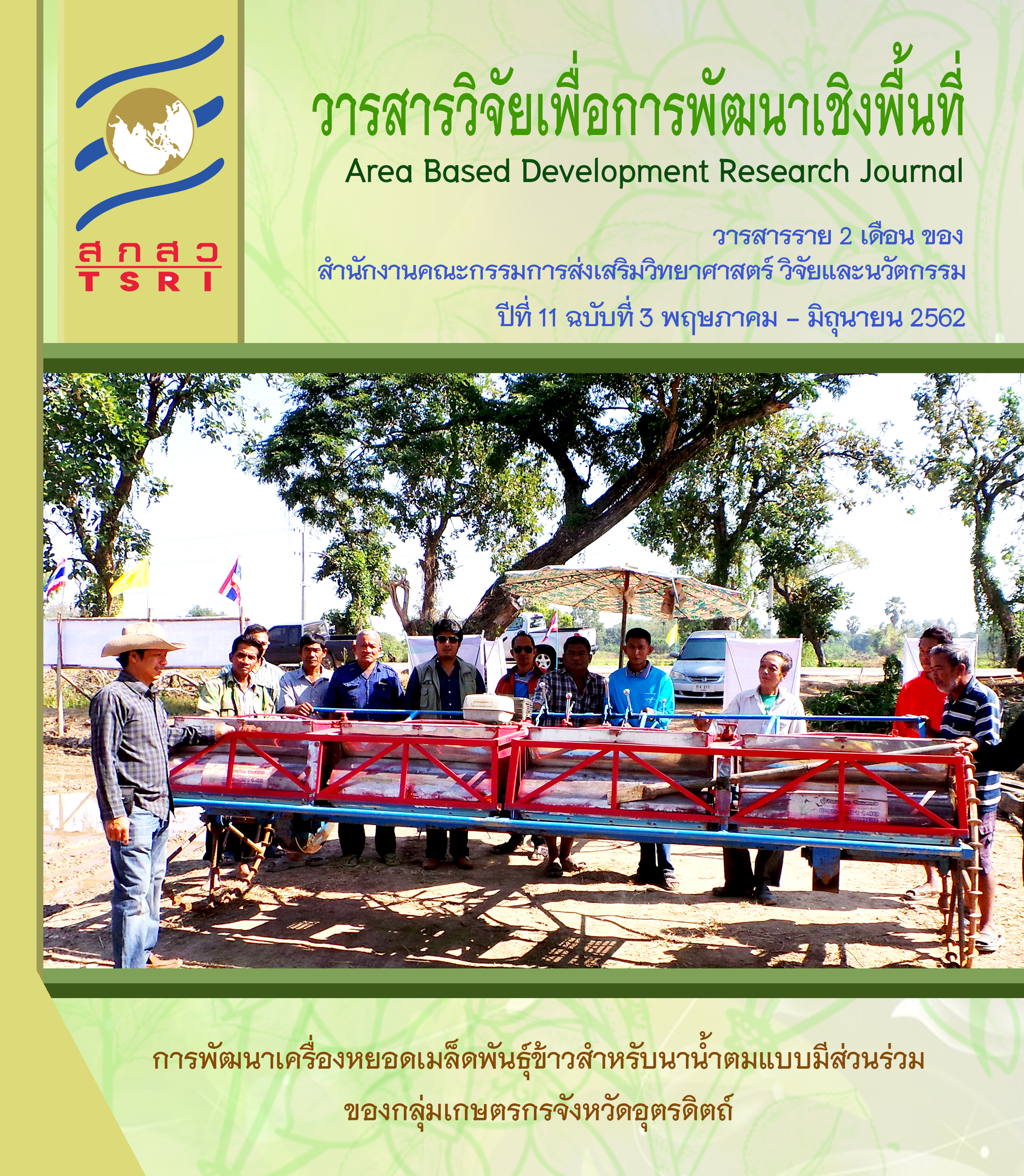The Power of Language: Co-Creation of Mutual Values and Thai Language Abilities in Thai-Malay Muslim Farmers’ Transmission of Local Organic Rice Farming Innovation in Ban La-han, Narathiwat Province
Main Article Content
Abstract
This research aims 1) to shift the thinking paradigm of Thai-Malay Muslim farmers from believing that they could not communicate in the Thai language to believing otherwise, and 2) to transform their intangible knowledge into concrete practices. The conceptual framework used here includes the concept of transformative learning, the formation of relationships between Thai-Malay Muslim farmers adopting local organic rice farming practices and experts in Thai studies, and the application of learning accomplishments towards co-creating mutual values. Concerning the methodology of this study, a participatory research strategy was applied. The Thai-Malay Muslim farmers’ Thai language communication skills were developed through co-design of knowledge, co-creation of knowledge, and co-dissemination of knowledge. The development involved 4 activities: 1) collecting data on abandoned rice fields and farming areas; 2) collecting data on the quantities of rice produced annually, as well as examining whether such production was sufficient to match household consumption; 3) mapping the quantities of wet-season rice and dry-season rice areas, and 4) the brainstorming of the Thai-Malay Muslim farmers’ ideas about being professional farmers. It should be noted that Thai language knowledge and communication skills were integrated throughout these activities. Experts provided the farmers with guidance on such issues as word sequences in the Thai language, presentation sequences, clarification of information, explanation of tables and maps, and demonstration. These encounters allowed the farmers to constantly practice their Thai language communication skills. The activities not only encouraged the farmers to co-create knowledge and instilled in them the value of the Thai language, but they also satisfied the participants’ language development needs. The farming participants changed their beliefs and overcame their fear of using the Thai language. Therefore, it can be said that, because of their improved Thai abilities, they would be able to use the language to transfer their knowledge about local organic rice farming practices to others, such as the young and those interested in farming. By way of such empowerment, these people, too, could then access the wisdom of the Thai-Malay Muslim farmers.
Article Details

This work is licensed under a Creative Commons Attribution-NonCommercial-NoDerivatives 4.0 International License.
Area Based Development Research Journal values copyright protection and licensing to safeguard author rights and facilitate the appropriate dissemination of research. Our policies ensure openness, accessibility, and attribution. Authors retain copyright ownership, and articles are published under a Creative Commons Attribution License (CC BY), allowing sharing, adaptation, and proper attribution. Authors have the freedom to publish under the CC BY license, granting broad reuse and distribution permissions. The journal supports posting articles on third-party repositories, adhering to institutional and funding restrictions. Author guidelines detail copyright and licensing requirements, empowering authors with knowledge about their rights and responsibilities. These policies cultivate an environment of collaboration, openness, and responsible sharing, benefiting authors and the research community while honoring intellectual property rights.
References
Antoni, K. (2012). Kotodama and the Kojiki: The Japanese “Word Soul” between mythology, spiritual magic, and political ideology. BAJR Beiträge des Arbeitgebers Japanische Religionen, 4, 1-13.
Chem, T., & Krogh, L. (2017). Co-creation in higher education: Students and educators preparing creatively and collaboratively to the challenge of the future. Rotterdam: Sense Publishers.
Chen, P. (2012). Empowering identity reconstruction of indigenous college students through transformative learning. Educational Review, 64(2), 161-180.
Farquhar, S., & Fitzsimons, P. (2011). Lost in translation: The power of language. Educational Philosophy and Theory. 43(6), 652-662.
Gallagher-Brett, A. (2005). Seven hundred reasons for studying languages. Southamton: University of Southamton.
Hodge, S. (2014). Transformative learning as an “Inter-Practice” phenomenon. Adult Education Quarterly, 64(2), 165-181.
Johnston, J. (2012). Factors that influence language development. Encyclopedia on Early Childhood Development, 1-5.
Kucukaydin, I. & Cranton, P. (2012). Critically questioning the discourse of transformative learning theory. Adult Education Quarterly, 63(1),43-56.
Levinson, S. C. (1983). Pragmatics. Cambridge: Cambridge University Press.
Mauser, W., Klepper, G., Rice, M., Schmalzbauer, B. S., Hackmann, H., Leemans, R., & Moore, H. (2013). Transdisciplinary global change research: The co- creation of knowledge for sustainability. Current Opinion in Environmental Sustainability, 5(3-4), 420 - 431.
Mey, J. L. (2001). Pragmatics: An introduction. Language development and literacy (2nd ed). University of British Columbia, Oxford: Blackwell.
Mezirow, J. (1997). Transformative learning: Theory to practice. New directions for adult and continuing education (No.74, 5-12). Summer:Jossey–BassPublishers.
Mezirow, J. & Taylor, E. W. (2009). Transformative learning in practice: Insights from community, workplace, and higher education. San Francisco: Jossey– ass.
Prahalad, C. K., & Ramaswamy, V., (2004). Co-creation experiences: The next practice in value creation. Journal of Interactive Marketing,18(3), 5-14.


